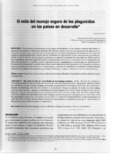| dc.contributor.author | García, Jaime E. | |
| dc.date.accessioned | 2015-08-19T20:36:12Z | |
| dc.date.available | 2015-08-19T20:36:12Z | |
| dc.date.issued | 1999 | |
| dc.identifier.issn | 1016-0469 | es_ES |
| dc.identifier.uri | https://repositorio.catie.ac.cr/handle/11554/7188 | |
| dc.description.abstract | n the the last two decades, in devcloping counlries. rnany training aClivitics for tbe safe use of peslicides llave taken place. However follow up evaluatioDS oC sorne oC ¡hese training eourses has revealed that even Ihough in most cases there has been a transfer oC knowledgc_ this has not res ultcd in a significant change of aU itude. lt seems ¡hat the training
activi ties ha\'e become a process of informi ng of cxist ing dangers <I nd of Ihe safely standa rds that must be
followed . \Ioith no real possibilities of changing Ihe daily habits of most workers that use these products. The word safe. \Ioidely and repeatedly used in the training eourses on pest icide managemcnt, is a mylh that offers Ihe participants a false sense of security, because Ihere is no practical impl ementation of safc management as such. The need to make greater efforts towards the disscmination of agricultural practices which reduce or eliminate the ll§C oC these products is emphasized | en_EN |
| dc.description.abstract | En los últimos dos decenios, en los países en desarrollo. se han realizado muchas actividades de capacitación en manejo seguro de plaguicidas. Sin embargo, algunas acciones de seguimi ento de algunos de estos cursos revelaron que a pesar de que en [a mayoría de los casos se transfieren conocimientos, no se logra un cambio de aptitud significativo. Parece que las actividades de capacitación se han con vertido en una labor mediante la cual se informa de los peligros existentes, así como de las normas de seguridad que deben seguirse, sin posibilidades reales de lograr un cambio en las práct icas cotidianas de la mayoría de los trabajadores que
usan estos productos. La palabra seguro, utilizada repetida y ampliamente en actividades dc capacitación sobre manejo de plaguicidas.. es un mito que ofrece una sensación de falsa seguridad a los educandos, porque no existe una implementación práctica del mancjo seguro. como tal. Se enfatiza la necesidad de realizar mayores esfuerzos en la difusión de prácticas agronómicas tendientes a reducir o eliminar el uso de estos produclos. | es_ES |
| dc.format.mimetype | pdf | |
| dc.language.iso | es | es_Es |
| dc.publisher | CATIE, Turrialba (Costa Rica) | es_ES |
| dc.relation.ispartof | Manejo Integrado de Plagas y Agroecología Número 52 (Junio 1999) | |
| dc.rights.uri | https://creativecommons.org/licenses/by-nc-nd/4.0/ | |
| dc.subject | PLGUICIDAS | es_ES |
| dc.subject | ENVENENAMIENTO | es_ES |
| dc.subject | RESIDUOS | es_ES |
| dc.subject | AGRICULTURA ORGANICA | es_ES |
| dc.subject | CAPACITACION | es_ES |
| dc.subject | PAISES EN DESARROLLO | es_ES |
| dc.title | El mito del manejo seguro de los plaguicidas en los países en desarrollo | es_ES |
| dc.title.alternative | The myth of safe use of pesticides in developing countries | es_ES |
| dc.type | Artículo | es_ES |
| dc.identifier.publisher | CATIE | es_ES |
| dc.identifier.publication | CATIE | es_ES |
| dc.journal.issueNumber | 52 | |
| dc.journal.pages | 25-41 | |



